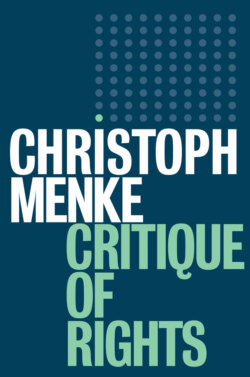Читать книгу Critique of Rights - Christoph Menke - Страница 17
3 London
ОглавлениеVilley’s words immediately make clear how the various authors whose formulations have laid the groundwork for the modern form of rights (which Savigny calls “right in the subjective sense”) proceed in fundamentally different ways. As we have seen, the modern revolution of rights reverses the priority between a right and law, between right as claim and right as law. This revolutionary reversal, however, is only possible because the conception of the legal claim itself is completely reformulated. This reconception involves the relation between possession and use, the “(fact) that” and the “for what purpose” of the legal claim – the juridical and the pre- or extra-juridical.
On the Roman view, a person’s legal status and their extra-juridical power are strictly distinguished from each other. Equal legal status consists in each person having their own, or an equal, fair share of a thing. In addition, legal equality in Rome involves the capacity for legal actions, above all, the commencement of actiones.20 A rightsholder’s power or freedom over his own, in the use of his fair share, is something radically different. The power (potestas) exercised by a person over his domain is private, or to put this more precisely, it is natural, because it precedes the legal system, only existing outside of it. “Freedom, from which men are said to be free, is the natural power of doing what we each please, unless prevented by force or by law.”21 In Rome, “for a jurist, power is an external condition, a prejuridical concept.”22 There is no connection between legal status – the fair share, one’s own – and private power or the natural freedom to dispose over a domain that is one’s due. A clear line divides the two, separating law from the pre-juridical.
In contrast, the juridical and the pre-juridical are linked to each other in the modern conception of rights. This is why Ockham calls right [Recht] “power,” and his successors call it “capacity,” “quality,” “competence,” or “freedom.”
